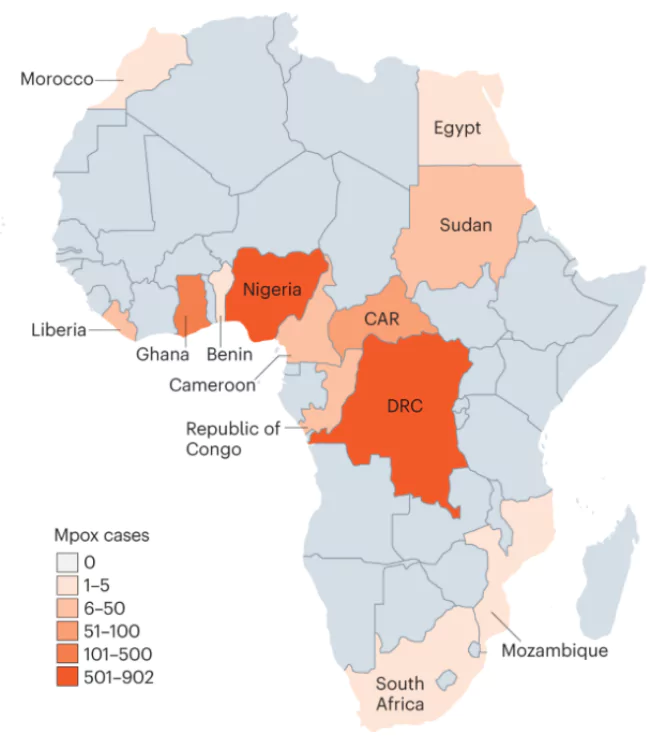The International Health Regulations (IHR) Emergency Committee of the World Health Organization (WHO) declared Mpox as a “Public Health Emergency of International Concern” (PHEIC)
- The 2024 determination of a PHEIC for mpox is the second in two years
- Mpox was first declared a PHEIC in july 2022 as it spread rapidly via sexual contact across multiple countries but was declared over in May 2023 after there had been a sustained decline in global cases
- WHO has released US$ 1.45 million from the WHO Contingency Fund for Emergencies to support surveillance, preparedness and response activities.
- Sweden also reported its first case of Mpox.
Enroll now for UPSC Online Course
The Present Outbreak
- Clade 1b: A new strain of the Mpox virus by the name of Clade1b is behind the outbreak which is rapidly spreading in eastern DRC, and in several neighbouring countries.
- Reported cases: The number of cases reported till August 2024 has already surpassed last year’s total cases with more than 15, 600 cases and 537 deaths.
- Infection Spread: The virulent strain Clade1b spread rapidly to 16 countries and six new countries were affected in 10 days.
- More than 100 laboratory-confirmed cases of clade 1b have been reported in four countries (Burundi, Kenya, Rwanda and Uganda) neighbouring the DRC last month.
About Mpox

- Mpox, an infectious zoonotic disease (disease that is transmitted between humans and animals) is one of the species of pox virus (such as smallpox and cowpox) characterised by a rash followed by bumps that appear on the skin.
- Pox viruses are oval shaped and have double-strand DNA
- Strains: There are two strains of mpox ie.
- Clade I: It is the dominant strain with mortality rate between 3-6%, mostly among young children and immunocompromised individuals.
- Clade II: It is far less dangerous with a case fatality rate of about 0.1 per cent.
- Causative agent: An orthopoxvirus.
- Transfer Agent: Animals like squirrels, dormice and certain types of monkeys and rats carry the virus and transmit through bites, scratches or bush meat preparation.
- Detection: Mpox was first detected in humans in 1970.
- Endemic: It is endemic to countries in central and west Africa with tropical climates and rainforests.
- Transmission: The virus is transmitted through direct contact with bodily fluids or skin lesions as well as indirect contact with lesion materials like contact with contaminated bedding or clothing, utensils etc although human-to-human transmission is limited
- Mpox can also be spread through respiratory droplets but requires direct, prolonged contact with someone with an active rash.
- Incubation Period: Mpox has a longer incubation period ranging between five to up to 21 days
- Symptoms: It starts as headache and backache, sore muscles and lack of energy, fever, and swollen lymph nodes before graduating to a Rash, which develops into raised spots before turning into fluid-filled blisters, which ultimately turn into scabs and fall off.
- Treatment: There is currently no medication for the mpox virus itself. However, the antiviral drugs cidofovir, brincidofovir and tecovirimat may be used.
- Vaccines: Two vaccines currently in use for small pox and Mpox namely, (JYNNEOS vaccine and ACAM2000) are recommended by WHO’s Strategic Advisory Group of Experts on Immunization, and are also approved by WHO-listed national regulatory authorities, as well as by individual countries including Nigeria and the DRC.
- Response: WHO guidelines for health authorities response to the crisis:
- Investigations: Non-endemic countries that have identified cases should undergo public health investigations including contact tracing, lab investigation, clinical management and isolation with supportive care.
- Genomic Sequencing: To identify the particular strain of the virus infecting individuals. Scientists are working to determine if the recent infections in Europe are related to strains in Africa.
- Vaccination: Deploy vaccines to manage close contacts, such as health workers.
- Robust surveillance, contact tracing and infection prevention and control: Strong surveillance and diagnostic systems, partnered with swift information-sharing, to ensure rapid reporting and communication of the outbreak.
Check Out UPSC CSE Books From PW Store
Public Health Emergency of International Concern (PHEIC)
- A PHEIC is defined as, an extraordinary event which has the potential to constitute a public health risk to other States through the international spread of disease and to potentially require a coordinated international response by The International Health Regulations (IHR)
- This definition implies a situation that is:
-
- Serious, sudden, unusual or unexpected
- Carries implications for public health beyond the affected State’s national border
- may require immediate international action.
|
![]() 16 Aug 2024
16 Aug 2024

